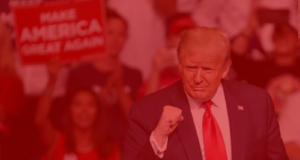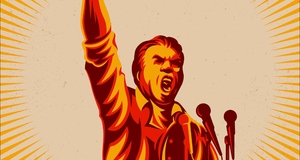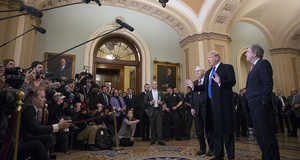Populist Mobocracy, Fear, and Lies: The Politics of American Populism
By
2019, Vol. 11 No. 02 | pg. 1/1
IN THIS ARTICLE
KEYWORDS
American politics today operates in an arena where truth and objective reality are bent to the designs of particular interests, powerful people and commercial profiteers. All facts are questioned; the truth has purposes. Populist and nationalist waves are pulsing through many western democratic republics in the West; these waves are a challenge to the values of liberal democracy. A populist believes that the common man is possessed of the highest virtues and an earthy, superior wisdom. Fareed Zakaria said in Foreign Affairs (2017) that, “populism sees itself as speaking for the forgotten ‘ordinary’ person and often imagines itself as the voice of genuine patriotism.” Geert Wilders (Netherlands), Norbert Hofer (Austria), Marine LePen (France), Nigel Farage (UK), Matteo Salvini (Italy), all shared with Donald Trump a gift for appealing to the common citizen motif while appropriating national identity. Each strums populist chords just barely outside the framework of neo-Fascism. The threat to democracy is palpable as citizens demand quick answers to complicated and long term social and economic problems. Populism has two faces. On the one side, populism can be a builder of positive change and expanded human rights, (e.g. Mahatma Gandhi or Martin Luther King), or on the other side, a flaming brand of fire that incinerates liberty, burns down community and condemns common decency to ashes (e.g. Hitler, Mussolini, or the Ku Klux Klan). Populism is not the same as social justice, and although often twisted to appear to represent the common people, is just as often a distraction away from what is really the exploitation, confusion, even oppression of the common average everyday folks. The expansion of rights and liberties for any one group is almost never done at the expense of other groups, especially elites. Many have said for example that any effort to regulate guns more strenuously, or to deny access to something like Assault style weapons, is a subtraction of the rights of those people, supported by the Second Amendment of the US constitution, to own, possess and bear arms. This is of course, a vast misreading of the Second Amendment because we all know that military grade weapons, and modern assault rifles were never in the minds of the Framers. More to the point, no one actually has an unfettered right to guns. What does it mean to “bear arms?” What is the definition of “arms” in all cases? As long as the right of the Second Amendment is sustained, no one would lose a right. Having said that, nothing is more final than death. To keep people safe from gun violence, it is impossible really to regulate anything but the guns—in the same ways that Americans employed common sense to regulate alcohol, driving, automobile manufacturing, smoking and tobacco use, and many other things. The greater right is the right to be healthy and safe; the greater right for example, is to be free from gun violence. Populism and guns do not belong in the same house. According to Jan-Werner Muller, in his book: What is Populism? (2016): “The danger to democracies today is not some comprehensive ideology that systematically denies democratic ideals. The danger is populism—a degraded form of democracy that promises to make good on democracy’s highest ideals,” (p. 6). Muller goes on to theorize:
And---Plato in The Republic was also discouraged by popular politics. Plato argued extensively, but especially in Book VIII of The Republic, that too much democracy will tempt the citizens to surge toward one man as their leader. The demagogue promises liberty as the goal for the average person. The “liberated” masses may then take the property of the wealthy for themselves while the elites and those with wealth become “enemies of the people.” Arrested as criminals, targeted “elites” suffer exile or execution (as was Socrates), by a mindless, passionate crowd. Plato warned that those who know least how to govern may take control of the polis, and in a paroxysm of hate and selfishness, they grasp what it is they want and destroy decency, dialogue and a pursuit of the good (Plato, 1985). Plato wrote:
Plato’s wild proposal of the “Philosopher King,” is grounded on the premise that you should not leave the governance of the polis in the hands of a demagogue or ruthless politician whose only virtue is pandering to citizens to do their worst. Unlike Plato, I argue that Baldwin was a philosopher for the oppressed, the broken, and the common people in his way. Even so, James Baldwin called out not in a populist voice, but to a higher moral claim. James Baldwin’s voice confronted common ignorance, called it out for what it truly was, and unafraid of exposure as a philosopher, scholar, critic, Black man, civil rights leader and a homosexual. James Baldwin did not compromise. Political movements that allow followers to compromise their moral values should always be suspect in our eyes and they are easily converted from populism to mobocracy: government by the mob. One of the key characteristics that distinguish one kind of populism over another is the manner in which fear may be deployed in rhetoric and propaganda, as well as the ideology of the putative or nascent movement. The great illusion is hidden in the belief that in acting as the mob, the common people are engaged in democratic action. This is when a fear born movement displays a threat to freedom. Resenting, hating, excluding and asserting your rights against “The Other” derives from a primordial passion in humanity called fear. It is not democratic. The element of fear in the rhetoric of populist movements inspires fanatic delusions. Where fear is present, we will also find ignorance, anger, hatred and violence. The only opposition to fear in politics is hope and confidence, and a belief in the democratic ideal: that people, under the proper circumstances are capable of leading self-determined lives. It is a lucky thing that it is possible for the democratic idea to predominate over fear. Even so, fear is a natural part of the human condition. The flight and startle mechanisms natural to human beings played a significant role in the evolutionary ability to survive. Fear generates a condition of heightened attentiveness and operates as a warning to be cautious and gives human beings suddenly quick perceptions. In these moments of quick perception, we are also most vulnerable to deception and error. We make false judgments and calculations. Seeing is not always believing, but believing, unfortunately, is often seeing. In 1948 Hannah Arendt explained the connection between mobs, thoughtlessness and identity in her book The Origins of Totalitarianism (1948) where she detailed the thoughtless desire to find meaning and value in life by becoming part of the mass movement. The illusion of meaning to the lost believers is so strong they will sacrifice themselves for the movement, even to the point of persecuting themselves. Hannah Arendt explained in The Origins of Totalitarianism (1948):
So, imagine someone who believes in the movement so much they are willing of course to accept persecution—even at the hands of their own leadership? Therefore, we should not wonder why a follower of a fear driven popular movement is willing to believe lies, to keep following a demagogue no matter what he or she sees and hears, and to wrap themselves in an echo chamber where they only hear the voices of those who make them comfortable. Fear and ignorance bring people together for mutual support, and combine in generating a mob—and mobs become politically very potent if their perceptions have been properly manipulated. In 1951, Eric Hoffer argued in his classic book The True Believer that in the mob, or the mass, human decency is lost as the individual casts judgment and doubt aside for the group mind. Eric Hoffer wrote in The True Believer that:
Fears, prejudices and anxieties of followers develop effective anchors, and create the conditions for a popular movement to flourish and in these cases the frightened and lonely find one another in what they believe is a common cause. Human beings have to make decisions in an environment for which their evolutionary natures are poorly prepared. Recognition of the power of fear shaping rhetoric can be traced to the 4th century BCE and Aristotle’s Rhetoric. Aristotle explained in The Rhetoric the value and the dangers of fear as a method to persuade an audience. In his research Aristotle compared fear to a kind of pain that predicts, or portends to the target audience the coming of a future harm or evil. Aristotle was convinced that people do not generally fear that they are unjust within themselves. Instead, we tend to believe we are in control of our own moral character. We fear other people because we believe or perceive them to have the power to harm us; and we imagine that the Other is motivated by the worst intentions. As people we tend to see ourselves as acting justice, and the Other is the one who is being unjust, or who threatens us. When we perceive another person or group as willing and able to hurt us, we are easily carried away by our imaginations. Fear and the Common GoodAristotle sincerely argued in the best circumstances of political and social life people should be able to think and act reflectively. To make ethical political choices people need to have an adequate conception of their welfare and the common good, and he was concerned that people tend to place too much value on the passions and the appetites: money, pleasure, consumption and personal honor or gratification. Only by persuasion and education are people shown that friendship, civic engagement, and actively seeking the common good—in other words truly virtuous actions—only these things bring real meaning and value to human lives and are superior to the appetites of money, pleasure and honor. Even so, none of this means anything if people cannot think for themselves, and this requires certain psychological conditions. If human beings are thoughtless and ignorant then their freedom is more a curse than a virtue. Political understanding and the kind of nuanced reasoning necessary to control fear and other less well guarded passions is not easy (and may help explain anti-immigrant, anti-Muslim, racial, ethnic and gender fears today in America). Such understanding requires cultivation, education and nourishment. Fear generates error and falsehood. Fear tempts people to misread what truly threatens them. For example, fear persuades people to believe that immigration bans, the possession of automatic weapons, harsh criminal punishments, or the use of capital punishment can make society safer. It is nearly impossible to convince fearful people that these policies are not only wasteful, but the evidence shows they do not make society safer. Hatred and fear often inspire feelings of disgust. How often have nations falsely called some group or nation a threat, and then converted the perceived enemies into disgusting and contemptuous forms of animal life? Whenever we hear our leaders refer to other people or groups as “our enemies,” or with slurs, or as criminals, we should be wary indeed. Fear in Sam Adams, Adolf Hitler and Donald Trump?Most Americans view Sam Adams as a Revolutionary Hero and founder of the Sons of Liberty, but Adams used fear in his rhetoric and propaganda. The most obvious case was Adam’s manipulation of the Boston Massacre, where he exaggerated the criminal violence of the British soldiers to agitate colonial anti-British sentiment. The Boston Massacre became a part of the American Revolutionary myth. Adams deceived his target audience, and correctly saw fear as the way to shake off the indifference of many Americans. He instigated a form of domestic terror campaign by the Sons of Liberty. Organized to spread the word of rebellion, the Sons of Liberty also used violent means on occasion to shut down a newspaper or editor who was loyal to the British Crown. The genius of Adams’ efforts can best be found in his creation of the “Committees of Correspondence.” These committees were able to spread effective fear-filled propaganda up and down the colonies through letter writing. This was the 18th Century version of the social network—slower but just as effective, (Thum and Thum, 2006). By comparison to a character like Sam Adams, history views Adolf Hitler as a malignant monster. Even so, like Sam Adams, Hitler’s primary propaganda tool was fear. To be clear, no one should equate Sam Adams (or Donald Trump for that matter) with Adolf Hitler and the Nazis. All the same, the use of common strategies of fear show the effectiveness and dangers in their use. Hitler used a number of specialized Projection Devices where fear was employed such as his claim that the cure for Germany’s problems could be found in scapegoats. Germany’s political and social diseases were blamed on scapegoats such as Jews, Gypsies, Liberal Politicians, Socialists, the Versailles Treaty, and so on. Fear allowed for possible purification by disassociation as the “Others” became the enemy. Using a similar technique, the National Populism of President Trump (in many ways given great inspiration and development by the excommunicated adviser Steve Bannon and Breitbart), also employs fear through scapegoats. To encourage fear and anger Donald Trump highlighted an array of American scapegoats who are part of a dark tableau of society. The Trump scapegoats include: the Press media, Muslims, Immigrants and Refugees, Mexicans, Liberals, Socialists, and Atheists. President Trump repeatedly proclaims (especially on Twitter) that these folks (scapegoats) such as the “dishonest press” are at the root of the “America carnage.” Hitler effectively employed fear in another unification device that exploited a perverse sense of German dignity. According to the Nazis, a special kind of dignity was available to all German people if they were to acquire it by living and thinking the right way. Hitler’s twist was that the Nazis equated right living and ideas with the Aryan superman: race, blood and soil, in the German Nation (Burke, 2006). This technique is a common ploy of national populist movements. For example, in Donald Trump’s appeals (invented by Steve Bannon) three principles are central: 1) Unfettered capitalism; 2) Judeo-Christian values; and 3) patriotic nationalism. As President Trump proclaimed, there are no divisions in America as long as Americans accept one patriotism and one nationalism. In his 2017 Inaugural Address, Trump put it this way:
And President Trump later added:
Trump’s populist nationalism rejects differentiation along color, religious, ethnic or gender lines. No one is allowed to be a victim. With “right thinking”—especially the right kind of Judeo-Christian thinking—all may be included as part of the nation. The technique creates an artificial separation between “real Americans” and (in the original form of the Bannon/Trump world view), and all the rest who will be excluded if unwilling to join. People who do not agree with these shared values are not welcome in America and the Trump device exploits fear and opposition to immigrants-- and especially Muslims, or illegal immigrants from Mexico—a land of “Bad Hombres,” drug dealers and rapists. President Trump is not Adolf Hitler, but he clearly employs scapegoats, resentment and exclusion, as propellants for a fear centered propaganda machine. One of the chief threats to democracy and the American Republic may lie in the corroding of the inner dispositions to democracy and civic life. The challenge to forming that more perfect Union, as Lincoln (1861) described in his first Inaugural Address, is battling the rhetoric of fear, and the mendacity that accompanies it in politics. Fear in political rhetoric is poison in the democratic well. Fear brings out our worst beliefs and most ignorant ideas. The antidote to the poison of fear is reason, common sense, healthy skepticism, informed dialogue and common decency. James Madison said in Federalist No. 55:
Madison was unaware of human psychology but he possessed an astute awareness of human frailty. Checking the ambitions of “men” was the most plausible method of government operating with his world view, and this meant channeling the ambitions of the popular citizenry, and also the political leaders and institutions. Madison believed that human beings, given time, opportunity and intelligence, would eventually control fear, violence and hatred with rule of law and the proper institutions. Self-government is never perfect, but for Madison it is a theoretical calculation that “presupposes the higher qualities of human nature.” That bet—or gamble—lies at the core of the democratic ideal or democratic possibility. Fear, especially nationalistic fear, is therefore very dangerous to democracy. Populism is perhaps always a degraded kind of democracy, but populism itself is not the main danger so much as it is the type of populism. Liberal democracy is possessed of certain values; values intimated in Madison’s political theory, and among these in the 21st century is pluralism. For liberal values to flourish, a certain amount of reflective thinking, as well as caution, is required. The Madisonian system relies on enough of that reasonable and informed guidance to survive in an unpredictable world. Fear and NationalismThe Framers of the U.S. Constitution understood that the American Republic was not, and could not be, perfect at the beginning. What Americans inherited from their revolution is an uncharted path to the future. Given qualified tools of self-determination, liberty and rights to make the journey, Americans will decide how they wish to define the role of government in their lives. To make a more perfect union will likely mean separating American skepticism toward government intellectually from the ideals of democratic governance which must accept rule of law, compromise and common sense. The problem of nationalist populism founded on fear is that the most vital of the democratic instincts are extinguished by a narrow world view that separates all Americans from “real Americans.” This was (and remains) the danger in France in 2017 as the National Front Party surged forward in French national elections. The national Front was defeated, but the question remains: for how long? The Brexit vote also indicated that many in Britain had succumbed to fears of European integration and what this could mean for the British identity. Italian elections in 2018 showed everyone that the populist-nationalist fever of fragmentation and anger is not yet broken in the West. Of course there are legitimate economic and social criticisms that the European Union must address, but what about the deeper values and principles the EU stands for: Human Rights, Western democracy, Constitutionalism, environmental sustainability, and global fairness. In the end, the rejection of a future of multilateral responsibility may lead the world to discard fairness and rule of law. The push back against democracy is about economic goods and services, but even more about values and identities. This is where America finds itself in the 21st Century, with a demagogic leader at the front of a populist movement. The most dangerous aspect is not that Trump is a populist. The dangers are in the anti-democratic values he espouses, the corruption he may encourage, and the crushing humiliation of the rule of law at both the domestic and international levels (Bazelon, 2017). The claim that the people have willed it all to be so is the very thing Madison feared. Madison believed the Republic could control for the rise of such factions. There was no way to know that the system that controls and balances minorities and their passions would one day see the rise of a populist and right-wing nationalist movement inspired by fear and frustration. Even so, there is hope that the tools of checking the rise of factions and holding back the potential distemper of popular movements and demagogues will aid in moving the Republic toward that “more perfect Union.” In 1962, James Baldwin said in the essay Down at the Cross:
Are Americans prepared in 2018 for a philosophical battle in defense of democratic values? National Populism has not emerged by accident, or like frogs sprouting out of the mud. In fact, nationalism and fear are on the rise also because of the selfish acts and intentions of the wealthiest elite classes, throughout the West, who attempted at the close of the 20th century to snatch back the successful spread of wealth, resources and rights among middle and working classes since the Second World War. The increasing concentration of wealth in the hands of fewer people is one good reason that conservative Western and American elites rebel at the terminology of “class warfare” and racism in politics. Somehow though, the onrushing political result of a surging right-wing identity politics may have many folks wishing for a return to the old rhetoric of “class warfare.” ReferencesArendt, Hannah. (2004). The Origins of Totalitarianism. New York: Random House Inc. [1951] Aristotle. (1940). “The Rhetoric,” in The Basic Works of Aristotle. New York, Random House. Aristotle. (1946). The Politics of Aristotle. (Ernest Barker, Trans.). London: Oxford University Press. Bazelon, Emily. (2017). “The Department of Justification,” New York Times Magazine. https://www.nytimes.com/2017/02/28/magazine Burke, Kenneth. (2006). “The Rhetoric of Hitler’s Battle,” in Propaganda and Persuasion: New and Classic Essays. Garth s. Jowett and Victoria O’Donnell, eds. Thousand Oaks: Sage Publications, pp. 149-168, (1941). Fromm, Erich. (1941). Escape From Freedom. New York: Avon Books. Guilford, Gwynn and Nikhil Sonnad. (2017). “What Steve Bannon Really Wants,” Quartz, 2/6/2017. https://qz.com/898134what-steve-bannon-really-wants/ Hamilton, Alexander and James Madison, John Jay. (2001). The Federalist. (Gideon Edition). George W. Carey and James McClellan eds. Indianapolis: Liberty Fund. (1787-1788) Hoffer, Eric. (1951). The True Believer. New York: Mentor Books. Jowett, Garth S. and Victoria O’Donnell, (2015). Propaganda and Persuasion, 6th ed. Thousand Oaks: Sage Publications. Judis, John B. (2016). The Populist Explosion: How the Great Recession Transformed American and European Politics. New York: Columbia Global Reports. Muller, Jans-Werner (2016). What Is Populism? Philadelphia: University of Pennsylvania Press. Nussbaum, Martha C. (2012). The New Religious Intolerance: Overcoming the Politics of Fear in an Anxious Age. Cambridge: Harvard University Press. Thum, Gladys and Marcella Thum. (2006) “War Propaganda and the American Revolution: The Pen and the Sword,” in Propaganda and Persuasion: New and Classic Essays. Garth S. Jowett and Victoria O’Donnell, eds. Thousand Oaks: Sage Publications. (1974). Zakaria, Fareed. (2016). “Populism on the March: why the West is in Trouble,” in Foreign Affairs, vol. 95, no. 6, November-December Suggested Reading from Inquiries Journal
Inquiries Journal provides undergraduate and graduate students around the world a platform for the wide dissemination of academic work over a range of core disciplines. Representing the work of students from hundreds of institutions around the globe, Inquiries Journal's large database of academic articles is completely free. Learn more | Blog | Submit Latest in Political Science |


















